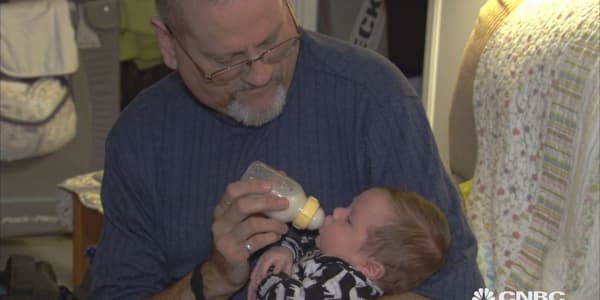The death of Sen. John McCain from glioblastoma on Saturday once again sheds light on this devastating illness and the need to find a cure. It is the same brain cancer that took the life of Joe Biden's son, Beau, back in 2015, and former Sen. Ted Kennedy in 2009.
"It is very sad about the outcome of Sen. McCain, yet it reminds us how brutal and deadly this disease can be and how much work is still ahead of us to combat it," said Mazen Kamen, president of the Kamen Brain Tumor Foundation in New York City. The nonprofit organization aims to provide new and effective treatment strategies for brain cancer, especially for children. Kamen's own son lost his battle to glioblastoma in 2016.
Daunting statistics
Sen. McCain's brain cancer was determined just a year ago after he underwent surgery to remove a blood clot over his left eye at the Mayo Clinic Hospital in Phoenix. Lab results determined there was a link between the clot and the tumor.
Glioblastoma multiforme is the most common and deadliest of the glial tumors because the cells reproduce so rapidly. They can be found anywhere in the brain or spinal cord. The tumor grows by turning normal brain cells into stem cells, which continuously replicate and regrow. So even if a tumor is surgically removed, it is difficult to extract every cancerous cell; any left behind will result in the growth of a new tumor.
He was not only a hero during his lifetime but also a hero during his illness. ... This is a life lesson to all of us who face adversities in life.Mazen Kamenfounder, Kamen Brain Tumor Foundation
According to the American Brain Tumor Association, there are approximately 700,000 people in the United States living with a primary brain and central nervous system tumor. Of these, 14.9 percent are glioblastomas. Glioblastomas represent the highest number of cases of all malignant tumors, with an estimated 12,760 new cases predicted in 2018.
Since 1985, there have been only four FDA-approved drugs to treat the more than 120 different types of brain tumors, according to
the National Brain Tumor Society. Between 1998 and 2014, claims the NBTS, 78 investigational brain tumor drugs were entered into the clinical trial evaluation process, and 75 of them failed.
More from Modern Medicine:
Immunotherapy drugs slow skin cancer that has spread to the brain
Hope for Lyme disease victims: Race is on to develop new tests — and a vaccine

Traditional therapies for brain cancer — surgery, chemotherapy and radiation — haven't been very successful, said Dr. José Baselga, chief medical officer and physician-in-chief at Memorial Sloan Kettering Cancer Center, because the brain is designed so toxins can't infiltrate it. "It is very challenging to have chemotherapy get to the brain with a good dose," he said. Instead, Dr. Baselga says researchers and scientists are making strides in what he calls precision medicine.
Making new inroads in lifesaving research
Kamen and his wife Jill, both founders of the Kamen Brain Tumor Foundation, are committed to the promise of precision medicine.
Their foundation recently provided funding to the Dana-Farber Cancer Institute to continue its research on immunotherapy — testing chemotherapy agents in the lab beforehand to see if they can cross the blood-brain barrier.
"In the past, there was no way of knowing for sure which agents could cross the blood-brain barrier and which ones could not. Now they can see which ones will infiltrate the tumor in the hope of killing it," said Mazen.
The Kamen Brain Tumor Foundation also recently funded Memorial Sloane Kettering Cancer Center's research on intrathecal radioimmunotherapy, in which immune drugs are tagged with radiation and are inserted directly into the fluid surrounding the brain and spinal cord to kill the tumors. Injecting the tumor directly with meds, including immune meds, and watching the progress is a way to avoid surgery, said Mazen.
Their latest research involves growing the actual brain tumor tissue extracted from the patient in the laboratory, said Mazen. "Now we have a way to deliver medicines through the blood-brain barrier, something we were not able to do before," he said. "In the lab, scientists can determine which therapy — meds, radiation, immune therapy — works and then apply that to the patient and be comfortable that it will concentrate in the tumor tissue. This avoids giving therapies that do not work and only give serious side effects," said Mazen.
Another trial under way now: tagging the patient's own T-cell immune cells with a specific virus in the lab and injecting them into the patient's bloodstream in the hope that it will directly attack the tumor's blood supply.
Mazen and Jill Kamen are hopeful that time will tell.
"Sen. McCain was not only a hero in his lifetime but also a hero during his illness. He was a fighter and took his illness with dignity and grace. This is a life lesson to all of us who face adversity in life," said Mazen. "He was a great man, and we owe it to future generations to find a cure to this devastating disease."





